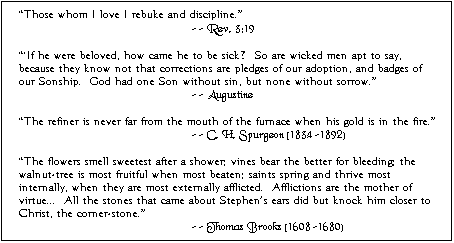

[Here, we continue our reprint of excerpts from John Flavel's book Navigation Spiritualized. John Flavel was a 17th Century minister in the seaside town of Dartmouth, England. A good many of his parishioners made their living on the sea, and so Mr. Flavel wrote Navigation Spiritualized, a book which draws parallels between things of the sea and spiritual things. This book is a masterpiece in the way it communicates spiritual truths in the language of its target audience, the seamen of Dartmouth. In fact, it was written specifically for the seamen to take on voyages and read, so that (for example), while they sailed the boundless seas, they could read of God's boundless mercies; or, while they adjusted their sails for shifting winds, they could read how to prepare their souls for the shifting winds of life; etc. And indeed, though few of us are seamen, we are all on a voyage through this life, so (I dare say) we may all profit from this study.]--Ed.
Sea-waters drained through the earth are sweet;
So are the afflictions which God's people meet.
OBSERVATION.
The waters of the sea, in themselves, are brackish and unpleasant, yet being exhaled by the sun, and condensed into clouds, they fall down into pleasant showers; or if drained through the earth, their property is thereby altered, and that which was so salt in the sea, becomes exceeding sweet and pleasant in the springs. This we find by constant experience: the sweetest crystal spring came from the sea (see Eccl. 1:7).
APPLICATION.
Afflictions in themselves are evil (see Amos 2:6), very bitter and unpleasant (see also Heb. 12:11). Yet not morally and intrinsically evil, as sin is; for if so, the holy God would never own it for His own act as He doth (see Mic. 3:2), but always disclaimeth sin (see James 1:3). Besides, if it were so evil, it could, in no case or respect, be the object of our election and desire, as in some cases it ought to be (see Heb. 11:25), but it is evil, as it is the fruit of sin, and grievous unto sense (see Heb. 12:11). But though it be thus, brackish and unpleasant in itself, yet, passing through Christ and the covenant, it loses that ungrateful property, and becomes pleasant in the fruits and effects thereof unto believers.
Yea, such are the blessed fruits thereof, that they are to account it all joy when they fall into divers afflictions (see Jam. 1:1,2). David could bless God that he was afflicted, and many a saint hath done the like. A good woman once compared her afflictions to her children: "For," (saith she), "they put me in pain in bearing them; yet as I know not which child, so neither which affliction I could be without."
Sometimes the Lord sanctifies afflictions to discover the corruption that is in the heart (see Deut. 8:2), it is a furnace to shew the dross. Ah! when a sharp affliction comes, then the pride, impatience, and unbelief of the heart appear: Matura vexatio prodit seipsam. When the water is stirred, then the mud and filthy, sediment that lay at the bottom rise. Little, saith the afflicted soul, did I think there had been in me that pride, self-love, distrust of God, carnal fear, and unbelief, as I now find. O where is my patience, my faith, my glory in tribulation? I could not have imagined the sight of death would have so appalled me, the loss of outward things have so pierced me. Now what a blessed thing is this to have the heart thus discovered.
Again, sanctified afflictions discover the emptiness and vanity of the creature. Now, the Lord hath stained its pride, and veiled its tempting splendor, by this or that affliction; and the soul sees what an empty, shallow, deceitful thing it is. The world (as one hath truly observed) is then only great in our eyes, when we are full of sense and self: but now affliction makes us more spiritual, and then it is nothing. It drives them nearer to God, makes them see the necessity of the life of faith, with multitudes of other benefits.
But yet these sweet fruits of affliction do not naturally, and of their own accord, spring from it; no, we may as well look for grapes from thorns, or figs from thistles, as for such fruits from affliction, till Christ's sanctifying hand and art have passed upon them.
The reason why they become thus sweet and pleasant (as I noted before) is, because they run now in another channel: Jesus Christ hath removed them from mount Ebal to Gerizim; they are no more the effects of vindictive wrath, but paternal chastisement. And, as Mr. Case well notes, "a teaching affliction is to the saints, the result of all the offices of Jesus Christ. As a king, He chastens; as a prophet, He teacheth, viz. by chastening; and, as a priest, He hath purchased this grace of the Father, that the dry rod might blossom, and bear fruit."[1] Behold, then, a sanctified affliction is a cup, whereinto Jesus hath wrung and pressed the juice and virtue of all his mediatorial offices. Surely, that must be a cup of generous, royal wine, like that in the supper, a cup of blessing to the people of God.
REFLECTION.
Hence may the unsanctified soul draw matter of fear and trouble, even from its unsanctified troubles. And thus it may reflect upon itself: O my soul! what good hast thou gotten by all or any of thy afflictions? God's rod hath been dumb to thee, or thou deaf to it. I have not learned one holy instruction from it; my troubles have left me the same, or worse than they found me; my heart was proud, earthly, and vain before, and so it remains still; they have not purged out, but only given vent to the pride, murmur, and atheism of my heart. I have been in my afflictions, as that wicked Ahaz was in his, who, "in the midst of his distress, yet trespassed more and more against the Lord" (see II Chron. 28:22). When I have been in storms at sea, or troubles at home, my soul within me hath been as a raging sea, casting up mire and dirt. Surely this rod is not the rod of God's children; I have proved but dross in the furnace, and I fear the Lord will put me away as dross, as He threatens to do to the wicked (see Psal. 119:119).
Hence also should gracious souls draw much encouragement and comfort amidst all their troubles. O these are the fruits of God's fatherly love to me! Why should I fear in the day of evil! or tremble any more at affliction? Though they seem as a serpent at a distance, yet are they a rod in the hand. O blessed be that skillful and gracious hand, that makes the rod, the dry rod to blossom, and bear such precious fruit.
Lord, what a mystery of love lies in this dispensation! that sin, which first brought afflictions into the world, is now itself carried out of the world by affliction, (see Rom. 5:12; Isa. 7:9). O what can frustrate my salvation, when those very things that seem most to oppose it, are made subservient to it, and, contrary to their own nature, do promote and further it?
